Antimicrobial resistance (AMR) affects the health and well-being of humans, animals, and the environment. As part of its regular work on preventing and managing AMR, CIDRAP-ASP focuses on several key areas that may be connected to AMR and are deserving of research and attention.
Outcomes research acknowledges that the factors affecting AMR are interconnected across clinical, social welfare, and economic domains. In global health, where competing health priorities put governments under incredible decision-making and funding pressure, outcomes research is a necessary tool to measure the impact of health interventions and help policymakers allocate necessary resources.
Reports
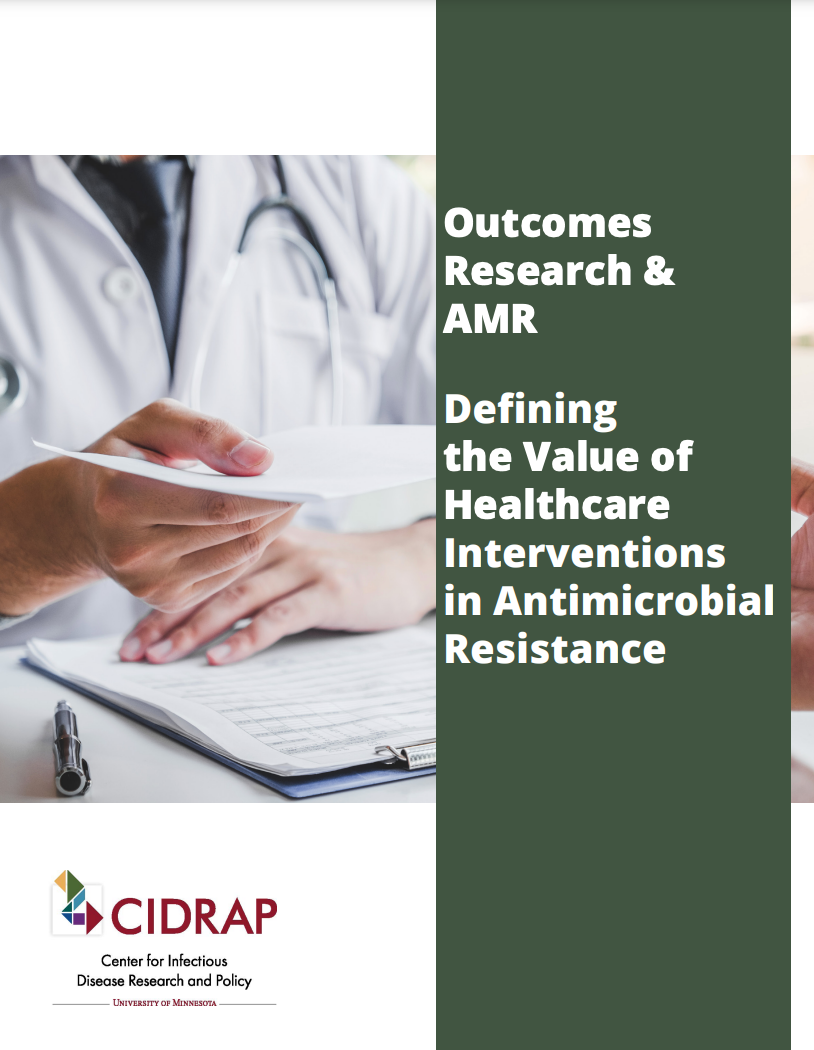
Outcomes Research & AMR I: Defining the Value of Healthcare Interventions in Antimicrobial Resistance (2023)
CIDRAP-ASP's Francesca Chiara, PhD, MRes, MSc, and Natalie Vestin, MPH, define outcomes research, explore how the concept has evolved over time, and describe how outcomes research can be applied to AMR interventions. The report is the first in a series of policy briefs supported by a grant from bioMérieux.
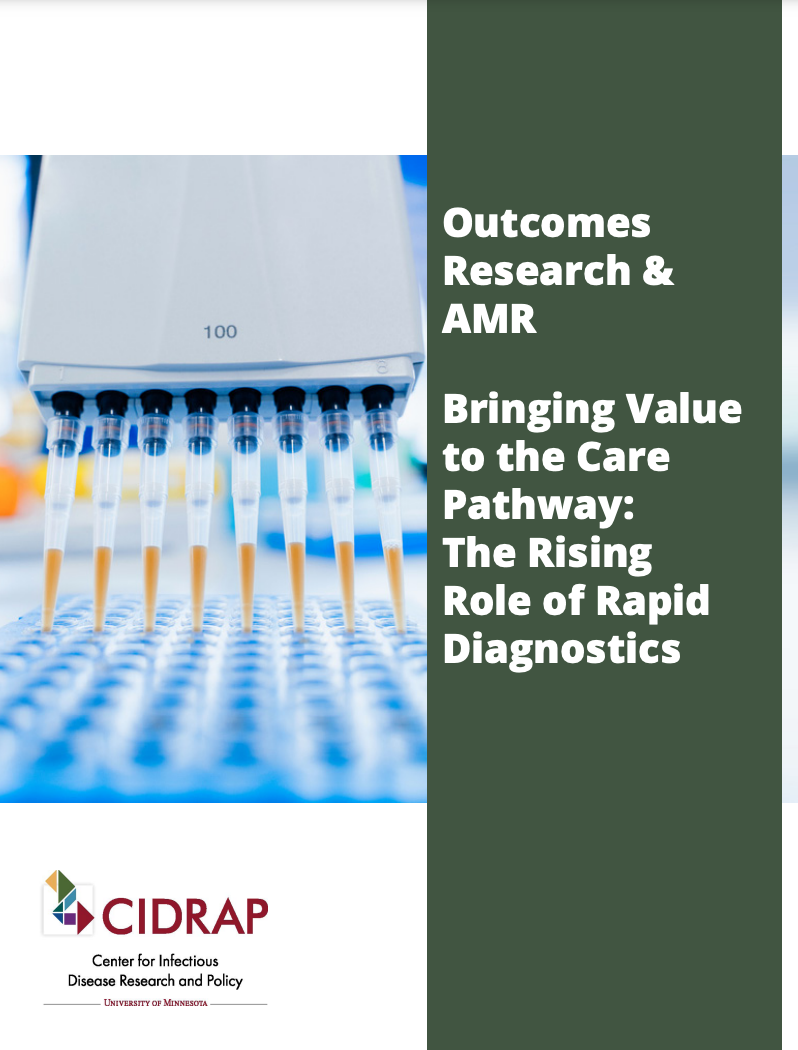 Outcomes Research & AMR II: Bringing Value to the Care Pathway: The Rising Role of Rapid Diagnostics (2023)
Outcomes Research & AMR II: Bringing Value to the Care Pathway: The Rising Role of Rapid Diagnostics (2023)
CIDRAP-ASP's Francesca Chiara, PhD, MRes, MSc, and Natalie Vestin, MPH, explore the role of outcomes research in making the value case for rapid diagnostics that help to identify infectious diseases and prevent AMR. Two case studies illuminate the role of outcomes research in: 1) clarifying the cost-effectiveness of rapid diagnostics for sepsis in different health contexts and 2) evaluating the cost-effectiveness of rapid diagnostics for invasive fungal infections in people living with HIV in Guatemala. The report is the second in a series supported by a grant from bioMérieux.
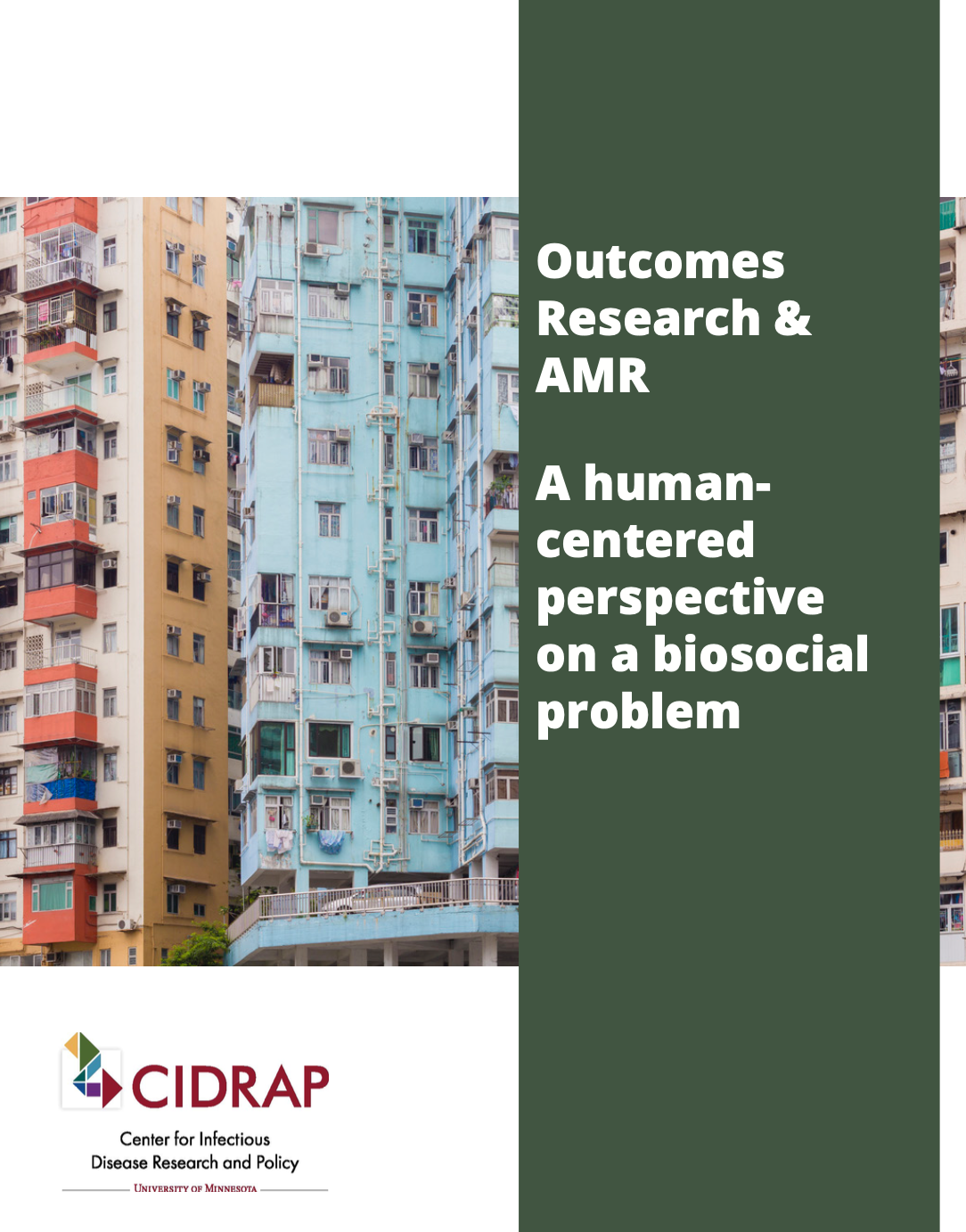 Outcomes Research & AMR III: A Human-Centered Perspective on a Biosocial Problem (2023)
Outcomes Research & AMR III: A Human-Centered Perspective on a Biosocial Problem (2023)
CIDRAP-ASP's Francesca Chiara, PhD, MRes, MSc, and Natalie Vestin, MPH, provide a socioeconomic perspective on AMR outcomes and cost-effectiveness research, advocating for greater consideration of social sciences perspectives, regional diversity and heterogeneity, and systems-based thinking in addressing the societal impacts and costs of AMR. The report is the third in a series supported by a grant from bioMérieux.
Literature Summaries
Economic and cost-effectiveness aspects of vaccines in combating antibiotic resistance (2023)
This literature review assessed two studies that directly estimated AMR costs averted due to pneumococcal vaccine use in China and Ethiopia, as well as a series of cost-effectiveness studies for immunization in the context of AMR, for vaccines in development and under license as of June 1, 2022.
Cost-effectiveness analysis and budgetary impact of anidulafungin treatment for patients with candidemia and other forms of invasive candidiasis in Brazil (2023)
This study evaluated the cost-effectiveness and budget impact of treating invasive candidiasis with anidulafungin compared with amphotericin B deoxycholate or amphotericin B lipid complex, finding that incorporation of anidulafungin as a first-line therapy for IC could save the Brazilian health system up to R$150 million reais (about $29.2 million USD) over 5 years.
Podcasts and Webinars
Stewardship Spotlight Podcast Miniseries Part 1: Improving patient outcomes through diagnostics in stewardship with Duane Newton, PhD
In this episode, we discuss the mini-review entitled “Clinical Utility of Advanced Microbiology Testing Tools” with co-author Dr. Duane Newton. In the paper, Dr Newton and team explore how to define the clinical utility of novel microbiology technologies. We discuss how to clearly articulate the value proposition of these new technologies to various stakeholders, including clinicians, the clinical laboratory, hospital administrators, and health systems. This miniseries was sponsored by an educational grant from bioMérieux.
Stewardship Spotlight Podcast Miniseries Part 2: Improving patient outcomes through diagnostics in stewardship with Tristan Timbrook, PharmD, MBA
In this episode, we discuss one of Dr. Timbrook’s previously published papers, “The Effect of Molecular Rapid Diagnostic Testing on Clinical Outcomes in Bloodstream Infections: A Systematic Review and Meta-analysis”. Our conversation focuses on how rapid diagnostic testing can be paired with antimicrobial stewardship policy to improve clinical outcomes. This miniseries was sponsored by an educational grant from bioMérieux.
Stewardship Spotlight Podcast Miniseries Part 3: Improving patient outcomes through diagnostics in stewardship with Eleftherios Mylonakis, MD, PhD
In this episode, we discuss one of Dr. Mylonakis’s previously published papers, “The Cost-Effectiveness of Rapid Diagnostic Testing for the Diagnosis of Bloodstream Infections with or without Antimicrobial Stewardship''. We focus on how rapid diagnostics, along with stewardship, can improve the quality and cost effectiveness of patient care, resulting in improved patient outcomes. This miniseries was sponsored by an educational grant from bioMérieux.
Stewardship Spotlight Podcast: Interview with Charis Marwick, MBChB, PhD
Dr. Marwich discusses her paper on how we should approach outcome measures to study antimicrobial stewardship interventions.
Approximately 2 million people die of fungal infections globally every year. Invasive
fungal infections and antifungal resistance present a particular risk to immunocompromised people, including people living with HIV, uncontrolled diabetes, transplant, and/or cancer, among many other conditions.
Reports
In a case study (beginning on p.21) for a report on outcomes research and rapid diagnostics, Natalie Vestin, MPH, describes a program to implement and evaluate the cost-effectiveness of rapid diagnostics for invasive fungal infections in people living with HIV in Guatemala.
Literature Summaries
The incidence of histoplasmosis and cryptococcal antigenemia among patients attending a large HIV clinic in Trinidad (2023)
This study evaluated the use of antigen assays to screen for Histoplasma capsulatum and Cryptococcus neoformans in 280 people living with HIV who had CD4+ counts of less than 350 cells per cubic millimeter (mm3) from November 2021 to June 2022 at an HIV clinic in Trinidad.
New perspectives on primary prophylaxis of invasive fungal infection in children undergoing hematopoietic stem cell transplantation: a 10-year retrospective cohort study (2023)
This retrospective study evaluates the incidence of invasive fungal infections (IFIs) in 308 children who received an allogenic hematopoietic stem cell transplant in a French hospital that relies on environmental hygiene and air filtration, rather than systematic primary antifungal prophylaxis, from 2010 to 2020.
Food and Drug Administration public workshop summary—development considerations of antifungal drugs to address unmet medical need (2023)
This article summaries discussions involving academia, the pharmaceutical industry, patient groups, and government agencies held during a 2020 US Food and Drug Administration (FDA) workshop to improve the regulatory and clinical trial infrastructure necessary to develop antifungals for invasive fungal infections.
Approach to the diagnosis of invasive fungal infections of the respiratory tract in the immunocompromised host (2023)
This review examines the intersecting patient characteristics, clinical and imaging signs and pathways, and diagnostic tests available and in development to aid in rapid assessment of invasive fungal respiratory infections in immunocompromised people.
Invasive mold infections following Hurricane Harvey—Houston, Texas (2023)
This study assesses the incidence of invasive mold infection at four hospitals—one of which is a cancer care facility—before and after Hurricane Harvey made landfall in Houston, Texas.
Rising incidence of Pneumocystis pneumonia: a population-level descriptive ecological study in England (2023)
This study used an NHS dataset representing about 99% of all hospitals in England to evaluate trends in the incidence of Pneumocystis jirovecii pneumonia from Apr 1, 2012, to Mar 31, 2022, along with trends in the use of co-trimoxazole from Jan 1, 2019, to Apr 30, 2022.
The WHO fungal priority pathogens list as a game-changer (2023)
This review describes the knowns and unknowns surrounding the global burden of serious fungal disease and the potential of the WHO fungal priority pathogen list to guide research, resource allocation, and public health action.
Cost-effectiveness analysis and budgetary impact of anidulafungin treatment for patients with candidemia and other forms of invasive candidiasis in Brazil (2023)
This study evaluated the cost-effectiveness and budget impact of treating IC with anidulafungin compared with amphotericin B deoxycholate or amphotericin B lipid complex, finding that incorporation of anidulafungin as a first-line therapy for IC could save the Brazilian health system up to R$150 million reais (about $29.2 million USD) over 5 years.
The “Histoplasmosis Porto Alegre manifesto”—addressing disseminated histoplasmosis in AIDS (2023)
In this summary of the Histoplasmosis Porto Alegre Manifesto, following the May 2022 Brazilian Histoplasmosis Meeting, the authors call for urgent improvements to the availability of Histoplasma antigen testing and liposomal amphotericin B antifungal treatment.
The current state of laboratory mycology in Asia/Pacific: a survey from the European Confederation of Medical Mycology (ECMM) and International Society for Human and Animal Mycology (ISHAM) (2023)
This study surveyed 235 centers across 40 countries and territories in the Asia-Pacific region from June 2021 to April 2022 to understand connections between the availability of fungal diagnostic and treatment capacity and Gross Domestic Product (GDP) per capita, acknowledging that national economic factors play a significant role in access to fungal disease diagnosis.
Burden of serious fungal infections in India (2022)
This data modeling study, accompanied by a literature review of 434 articles, aims to estimate the burden of serious fungal infections—aspergillosis, mucormycosis, candidiasis, and fungi that cause neglected tropical and other skin diseases—across India, including infection incidence and prevalence in people living with HIV.
Diagnostic capacity for invasive fungal infections in advanced HIV disease in Africa: a continent-wide survey (2022)
This first-ever study of diagnostic capacity for invasive fungal infections in people living with HIV across Africa assesses the availability of CD4 cell counts, cryptococcal antigen testing, lumbar puncture, India ink microscopy, histoplasmosis urinary antigen testing, Pneumocystis microscopy or polymerase chain reaction (PCR) testing, fungal culture, and magnetic resonance imaging (MRI) in public and private healthcare facilities in 48 African countries from October 2020 to October 2022.
Characteristics of antifungal utilization for hospitalized children in the United States (2022)
In this point-prevalence survey, members of the SHARPS (Sharing Antibiotic Reports for Pediatric Stewardship) Antibiotic Resistance, Prescribing, and Efficacy among Children study analyze antifungal prescribing data from 32 hospitals across 22 US states from June 2016 to December 2017.
Global consumption trend of antifungal agents in humans from 2008 to 2018: data from 65 middle- and high-income countries (2022)
In this study, researchers analyzed sales of systemic antifungals from 27 middle-income countries and 38 high-income countries from 2008 to 2018 stored by the IQVIA-Multinational Integrated Data Analysis System (MIDAS).
Access to medicines for treating people with cryptococcal meningitis (2022)
In this paper, the authors describe problems associated with access and affordability of the recommended antifungal treatment regimen for cryptococcal meningitis, despite global guidelines that posit it as preferred first-line therapy.
Podcasts and Webinars
Superbugs & You podcast: Episode 10. "Fungus Among Us: Resistant Candida auris" (2023)
Today, around the world, multidrug resistant and pan-resistant Candida auris has caused outbreaks in healthcare systems. In this episode, Andrew Jacobs, Bhavarth Shukla, MD, MPH, and Tom Chiller, MD, MPHTM, will cover how these outbreaks have affected patients, healthcare systems, and continued efforts to better understand and slow the impact of these infections.
Candida auris—An Emerging Multi-drug Resistant Yeast (2017)
CIDRAP-ASP hosted Tom Chiller, MD, MPHTM, Team Lead of the Mycotic Diseases Branch at the US Centers for Disease Control and Prevention, for a conversation about Candida auris and antifungal resistance.
News
CIDRAP-ASP journalist Chris Dall, MA, and other CIDRAP News reporters regularly publish news stories on fungal infections, antifungal resistance, and access to antifungal medications.
Monthly TweetChats
CIDRAP-ASP has partnered with The AMR Narrative to promote AMR advocacy, increase awareness, and develop a community of AMR champions and survivors.
We aim to equip patients and the public with the necessary knowledge to help them better understand AMR and issues related to it. Our goal is to promote and boost advocacy capacity to create a critical mass of people sustaining action for change.
Throughout 2023, we are hosting series of events in collaboration with The AMR Narrative to encourage meaningful conversations around AMR among healthcare professionals, patients and the public.
For more information regarding upcoming events, check out the CIDRAP-ASP AMR TweetChats page or the dedicated 'Events' page on The AMR Narrative website.
CIDRAP News Interviews with Patients and Patient Advocates
In interviews for CIDRAP News, CIDRAP-ASP reporter Chris Dall, MA, illuminates the histories and motivations of patients and patient advocates working to prevent antimicrobial-resistant infections.
World leaders aim to get back on track in fight against tuberculosis. Interviews with Maria Beumont, MD, vice president and chief medical officer for TB Alliance; and Eloisa Zepeda-Teng, executive director of TBPeople Philippines and a TB survivor.
Breaking the cycle: New treatments for recurrent C diff offer an alternative to repeated antibiotics. Interviews with Pamela McCollister, a patient who experienced recurrent Clostridioides difficile (C diff) infections; Christian Lillis, executive director of the C diff advocacy group the Peggy Lillis Foundation; Lisa von Moltke, MD, chief medical officer of Seres Therapeutics; and Jeffrey Silber, MD, chief medical officer of Vedanta Biosciences.
Amid anger and frustration, a leader in the fight against TB sees hope. Interview with Lucica Ditiu, MD, executive director of the Stop TB Partnership.
Pharmaceutical, diagnostics companies look to patients to help fight antibiotic resistance. Interviews with cystic fibrosis patient advocates Gunnar Esiason and Ella Balasa; Christian Lillis, president of the Clostridioides difficile awareness and advocacy group the Peggy Lillis Foundation; Candace DeMatteis, policy director for the Partnership to Fight Infectious Disease; Kamal Hamed, MD, MPH, chief medical officer of Spero Therapeutics; and Arnaud Favry, director of governmental & public affairs and patient value strategy at bioMérieux.
Foundation aims to help people 'see' C difficile. Interview with Christian Lillis, executive director of the Peggy Lillis Foundation.
Superbugs & You Podcast
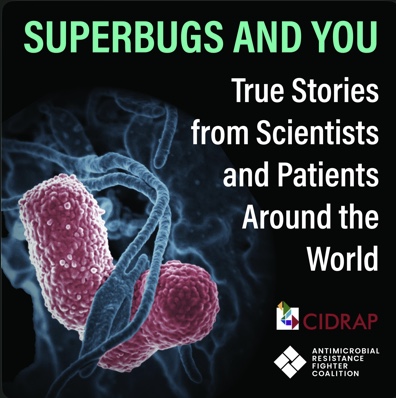
The "Superbugs and You" podcast series brings together stories about drug-resistant infections from patients, clinicians, and researchers. "Superbugs and You" is produced in collaboration with the Antimicrobial Resistance Fighter Coalition and supported by a grant from Becton, Dickinson and Company (BD).
Episodes describe feature patients' and/or patient advocates' perspectives on neonatal sepsis, gonorrhea, cancer and AMR, Clostridioides difficile (C diff), methicillin-resistant Staphylococcus aureus (MRSA), tuberculosis, sepsis, and more.
CIDRAP-ASP Newsletter: AMR and the Patient's Perspective
Nearly every month, the CIDRAP-ASP Newsletter features stories from patients and/or news about patient-centered efforts to reduce AMR and encourage appropriate antimicrobial use. Below are some highlights, but please subscribe to stay up-to-date.
UK patient experiences with AMR. In The Telegraph, Maeve Cullinan, MA, speaks with Caroline Sampson and Vanessa Carter about their experiences with drug-resistant infections, also featuring perspectives on the potential of genomic AMR surveillance from Neil Ward, MSc.
MDR TB Care in Ethiopia. The WHO features the story of Yeshiembet Moges, who developed a case of multidrug-resistant tuberculosis (TB) and received care from Ethiopia's specialized antimicrobial stewardship and TB treatment programs.
The effect of AMR on Financial Security in India. In a profile for the Global Antibiotic Research and Development Hub, a patient named Momipal in India speaks about how drug-resistant infections have affected her family and her financial security.
AMR and Inequality in the Lives of Sex Workers. On the One Health Trust's "One World, One Health" podcast, host Maggie Fox speaks with Salome Manyau, PhD, about her experiences learning about how drug-resistant sexually transmitted infections, poverty, and inequality interact in the lives of sex workers in Zimbabwe.
AMR in the Life of a COPD Patient Advocate. Euronews' Smart Health spoke with Iñaki Morán, the president of chronic obstructive pulmonary disease (COPD) patient advocacy organization EPOC España, about his experiences with AMR, COPD, and lung and colon cancers.
Global Taskforce of AMR Survivors. The World Health Organization announced the 12 members of the first Taskforce of AMR Survivors, comprising people who have survived or cared for those with serious drug-resistant infections, including bacterial infections and tuberculosis, HIV, and fungal infections. The taskforce will shape the global AMR narrative and improve awareness of the human toll of drug resistance.
Patients' Hopes for a New TB Regimen in the Philippines. In The Telegraph, Sarah Newey, MA, describes the move to introduce the 6-month BPaL (bedaquiline, pretomanid, and linezolid) regimen for drug-resistant tuberculosis in hospitals across the Philippines, also featuring the experiences of patients who have endured debilitating side effects as a result of the older regiment and are hopeful for the shorter and safer treatment.
Sepsis Awareness Month. September is Sepsis Awareness Month, and the Sepsis Alliance offers numerous resources for patients and families, including educational materials, stories from survivors and caregivers, and a virtual support community for anyone affected by sepsis.
A Patient's Experience with XDR-TB. The AMR Narrative features an interview with Ingrid Schoeman about her experience receiving treatment for extensively drug-resistant tuberculosis (TB) in South Africa and her commitment to ending both TB and the stigma associated with the disease.
Veterinary Surgeon Fights Drug-resistant Infection. On the Wellcome "When Science Finds a Way" podcast, host Alisha Wainwright speaks with veterinary surgeon Dr. John Kariuki, who contracted a Citrobacter freundii infection following surgery, conducted susceptibility testing when he suspected the wound was resistant to treatment, and received life-saving treatment after discovering that the organism was resistant to 18 antibiotics.
Neonatal Sepsis Advocacy and Support. The AMR Narrative features the story of Pernilla Rönnholm, who lost her premature daughter to an infection caused by extended-spectrum beta-lactamase-producing Klebsiella pneumoniae and founded an organization—Prematurföreningen Mirakel—to raise awareness about AMR.
Patients' Experiences with Invasive Fungal Infections. In the Wall Street Journal, Dominique Mosbergen describes the experiences of several patients and clinicians in attempting to treat invasive fungal infections, including those caused by Histoplasma, Coccidioides (Valley fever), and Candida auris.
People-centered TB Care for Ukrainian Refugees in Poland. In partnership with Polish and Ukrainian health authorities and Médecins Sans Frontières, the WHO launched a home-based, free-of-charge, and people-centered approach to oral treatment for drug-resistant tuberculosis in Poland, with a focus on reducing barriers to care and completion of treatment for Ukrainian refugees.
GARDP #PowerOfAntibiotics Campaign. The Global Antibiotic Research and Development Partnership (GARDP) developed a campaign—#PowerOfAntibiotics—to communicate stories from clinicians, researchers, and patients about how they use antibiotics around the world and the need to protect the effectiveness of life-saving medications.
Pharmacology Professor Survives Drug-resistant Bloodstream Infection. ReAct published perspective from Rianto Setiabudy, MD, PhD, a professor of clinical pharmacology at Universitas Indonesia, on his experience as a patient with a severe drug-resistant bloodstream infection.
AMR Educational Materials for Patient Empowerment. The European Health Management Association launched the "AMR-Educare—EduCation on Antimicrobial REsistance for the health workforce"—project, which will develop educational materials for healthcare workers concerned about antimicrobial prescribing, reducing antimicrobial waste, and empowering patients.
TB Survivors Advocate for Bedaquiline Access in India. In The Hindu, Maitri Porecha, MA, describes the Indian Patent Office's rejection of Johnson & Johnson's patent on bedaquiline in India beyond July 2023, making it possible for generic manufacturers to then produce the tuberculosis drug and make it available at a lower cost. TB survivors and patient advocates played a significant role in challenging the company's attempts to extend its patents.
TB Survivors, Advocates, and Clinicians Discuss Fighting Stigma. TB Proof posted videos about tuberculosis-related stigma from the points of view of TB survivors, advocates, and healthcare workers.
Global Patient Safety Charter. The WHO published news about the endorsement of the Montreux Charter on Patient Safety at the Fifth Global Ministerial Summit on Patient Safety. The Montreux Charter affirms that patient harm in healthcare is an urgent public health issue and urges countries to set priorities for medication safety, safe surgery, infection prevention and control, and AMR.
TB Coalition Calls for Vaccine Research. The TB Vax Arm—a global coalition of TB survivors, civil society organizations, and nonprofits—published a brief that calls on global leaders to prioritize TB vaccine research and development in all health and AMR agendas, arguing that economic models demonstrate the cost-effectiveness of developing and introducing new TB vaccines.
Launch of PFID EU Chapter. The Partnership to Fight Infectious Disease—a nonprofit group of patients, providers, community organizations, academic researchers, business and labor groups, and infectious disease experts active in developing solutions to address AMR across the US and Japan—announced the launch of an EU chapter.
Drug-Resistant Infections in Nepal. In the Kathmandu Post, Arjun Poudel describes challenges faced by patients and their clinicians as they confront antimicrobial-resistant infections in Nepal.
Reports
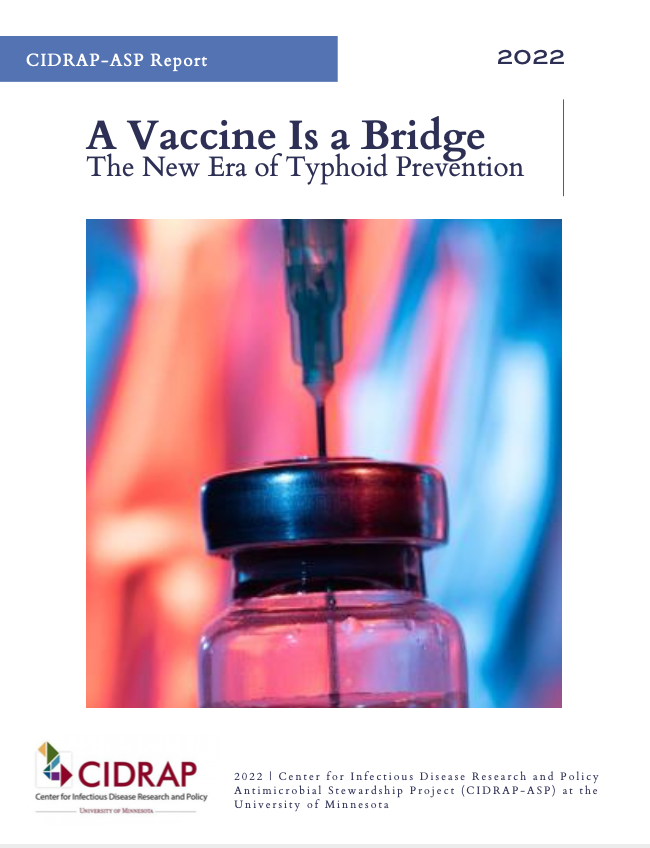
A Vaccine is A Bridge: The New Era of Typhoid Prevention (2022)
CIDRAP-ASP's Natalie Vestin, MPH, describes the global burden of typhoid, the emergence of drug-resistant strains, and the role that typhoid conjugate vaccine campaigns could play in typhoid prevention and control. The report was supported by a grant from Wellcome.
Literature Summaries
Vaccination is an integral strategy to combat antimicrobial resistance (2023)
This article on the implications of vaccines on AMR delves into who is most likely to benefit from bacterial vaccines, the challenges that AMR and antigen identification pose to vaccine development, and current and investigational vaccine development platforms.
Economic and cost-effectiveness aspects of vaccines in combating antibiotic resistance (2023)
This literature review assessed two studies that directly estimated AMR costs averted due to pneumococcal vaccine use in China and Ethiopia, as well as a series of cost-effectiveness studies for immunization in the context of AMR, for vaccines in development and under license as of June 1, 2022.
Typhoid fever surveillance, incidence estimates, and progress toward typhoid conjugate vaccine introduction—worldwide, 2018–2022 (2023)
This US Centers for Disease Control and Prevention report highlights the issues with typhoid diagnosis and data collection, the status of resistant strains, and the experiences of countries that introduced typhoid conjugate vaccines into their national immunization campaigns and/or held mass vaccination events.
The role of bacterial vaccines in the fight against antimicrobial resistance: an analysis of the preclinical and clinical development pipeline (2022)
This paper looks at vaccine candidates targeting pathogens on the WHO Priority Pathogen List.
Podcasts
Superbugs & You. Episode 12. "Vaccines and the Vulnerable: The Race to End Typhoid" (2023)
This episode covers the impact of vaccinations in preventing and slowing the spread of drug-resistant typhoid and the challenges to deploy effective programs to distribute typhoid conjugate vaccines. Guests include: Farah Naz Qamar, MD, MSc, Kathy Neuzil, MD, MPH, Denise Garrett, MD, MSc, and Calman MacLennan, BM, BCh, DPhil.
Our underwriters
Unrestricted financial support provided by

Supporting Underwriter
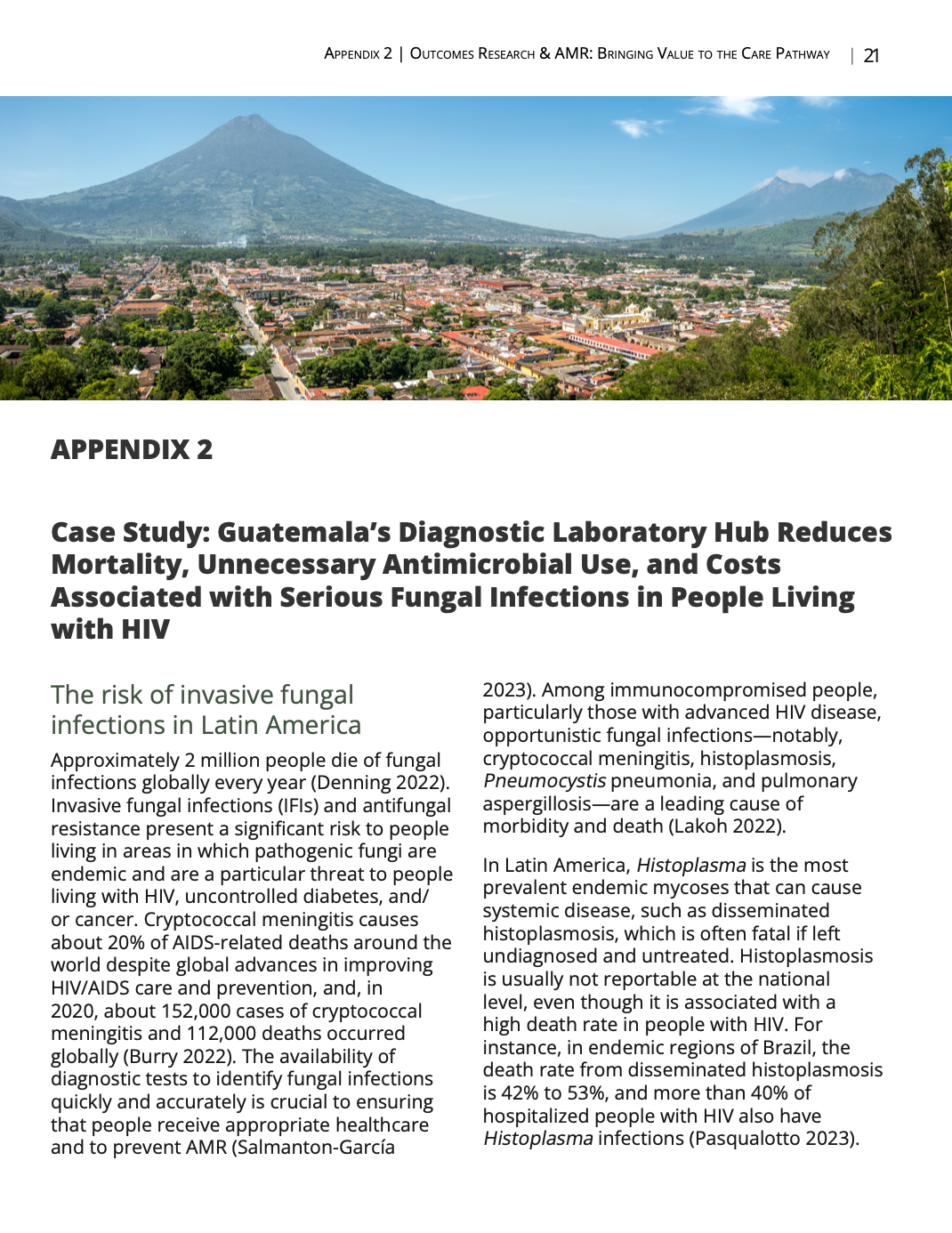 Outcomes Research & AMR: Bringing Value to the Care Pathway: The Rising Role of Rapid Diagnostics (2023)"
Outcomes Research & AMR: Bringing Value to the Care Pathway: The Rising Role of Rapid Diagnostics (2023)"






